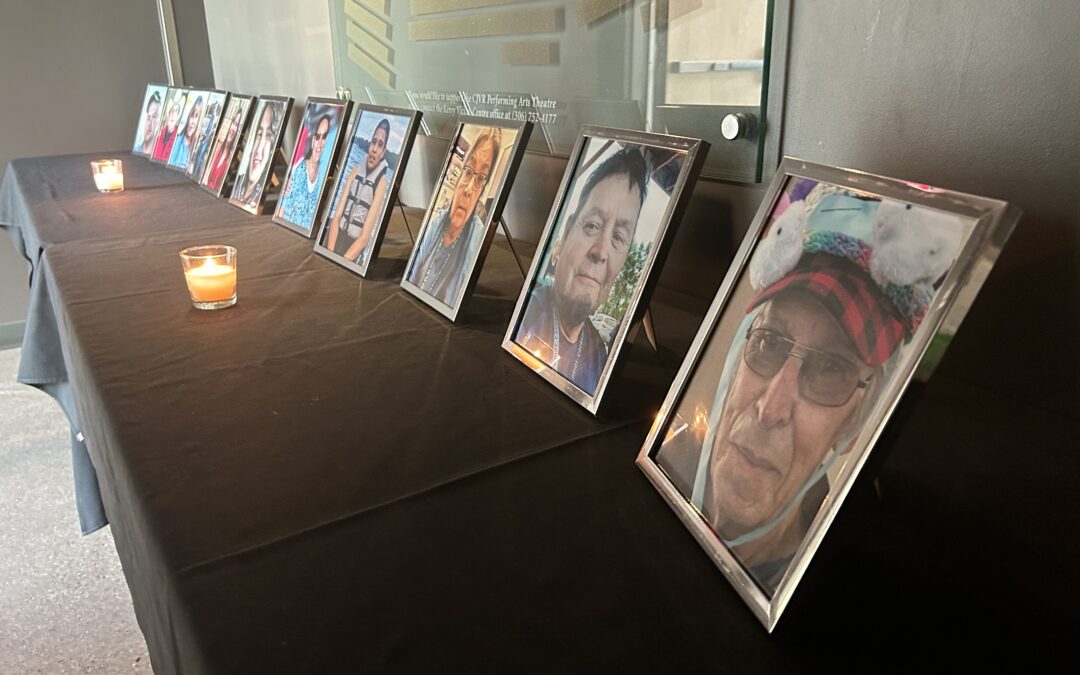WARNING: Distressing content
The Coroner’s Inquest looking at the mass stabbing on James Smith Cree Nation and in the Village of Weldon heard about the emergency response to the stabbings Monday morning.
Sherri Jule, Director Chief for Emergency Medical Services in the north for the Saskatchewan Health Authority (SHA) took the witness stand and testified about how paramedics responded to the mass casualty event. She explained ambulances from a range of communities, including Melfort, Prince Albert and Nipawin responded. STARS Air Ambulance was also part of the response with three helicopters, which is their entire fleet in Saskatchewan.
Carrie Dornstauder, who was the on call executive director for the SHA at the time as well testified Monday about how the health authority dealt with the injured who were brought to hospitals. Dornstauder said people injured in the mass stabbing were treated at a number of different facilities.
“We had four hospitals involved after the EMS response,” she said.
The first patient to arrive at hospital arrived at Victoria Hospital in Prince Albert. Injured people were also taken to hospitals in Melfort, Nipawin and Saskatoon. The most seriously injured were taken to Royal University Hospital in Saskatoon.
Due to the large number of people who were hurt in the stabbing, Dornstauder said a code orange was called. She explained this is done when hospitals are set to get a large number of patients at one time, which is generally the result of a single incident and is not the norm.
“It is extraordinary,” she said.
Alex Heron, an inspector with the Saskatchewan Highway Patrol testified about the supports provided by provincial law enforcement agencies on the day of the stabbing and in the days after. Heron told the inquest over 50 officers from highway patrol along with the Conservation Officers Service helped RCMP with a number of tasks, including securing crime scenes and general security.
The inquest as well learned about warrant enforcement in Saskatchewan. Staff Sgt. Ryan How, who is responsible for overseeing the Saskatchewan RCMP’s Enforcement and Response Team, which includes the warrant apprehension team took the stand Monday afternoon.
Staff Sgt. How explained how the warrant team uses a scale, which runs from one to four, with one being the highest to score offenders. How said with the new system in place Sanderson would still not be considered a top target for the team as he had not previously been convicted of serious crimes like murder or attempted murder and as a result doesn’t score high enough. How added Saskatchewan RCMP Enforcement and Response Team (SERT) is currently shorted staffed due to RCMP recruitment and retention issues.
“Certainly we can use as many bodies as needed,” he said.
In response to questioning from Keith Brown, the lawyer for James Smith Cree Nation, How said Sanderson was not a target for SERT as his warrant was out of Saskatoon, which made him a target of the Saskatoon Police Service. He said RCMP was not aware of the suspects’ presence on James Smith.
“We had no knowledge of Myles Sanderson,” he said.
No record found of 911 calls from night before violence
Monday morning saw Staff Sgt. Robin Zentner return to the witness stand. Zentner, who oversaw the investigation into the mass stabbing for the RCMP Major Crimes Unit was called back to testify after the inquest heard from Skye Sanderson. In her testimony, Skye, the former wife of Damien Sanderson said she had called RCMP on a number of occasions from a friends phone to complain about Damien and Myles on Sept. 4. The testimony came as a surprise to Coroner’s Council Tim Hawryluk, who promised to have the RCMP look in to the claims.
Zentner said RCMP investigators were not able to find any evidence of 911 calls being made from the number Skye provided RCMP on Sept 4. During her testimony Skye said she had mentioned to RCMP these calls but suggested the information could have been missed as her statement was only taken by hand and not recorded. Zentner said all three of the statements Skye gave police were either recorded via audio or video and in none of them did she mention making 911 calls on Sept. 4.
“We do not do handwritten statements,” said Zentner.
Talking Stick is a Saskatchewan-based free anonymous chat platform that connects people seeking emotional support to a trained Indigenous peer advocate 24/7. https://my.talkingstick.app/
